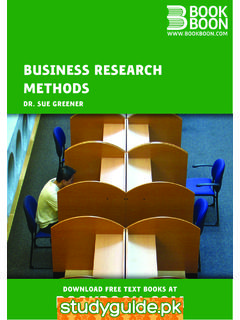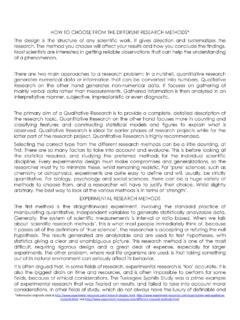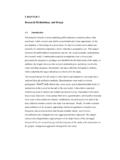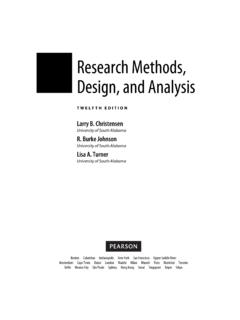Transcription of PSYCHOLOGY — RESEARCH METHODS - Wiley
1 PSYCHOLOGY RESEARCH METHODSWhat RESEARCH METHODS and key science skills are used in VCE PSYCHOLOGY ? cHaPTer 1 RESEARCH METHODS in psychologyc01 ResearchMethodsInPsychology 1 16 August 2016 11:09 AMUNCORRECTED PAGE PROOFSc01 ResearchMethodsInPsychology 2 16 August 2016 11:09 AMUNCORRECTED PAGE PROOFSKey Science SKillS develop aims and questions, formulate hypotheses and make predictions plan and undertake investigations comply with safety and ethical guidelines conduct investigations to collect and record data analyse and evaluate data, METHODS and scientifi c models draw evidence-based conclusions communicate and explain scientifi c ning PSYCHOLOGY and its subject matter 00 Mental processes and behaviour 00 PSYCHOLOGY as a scientifi c study 00 Steps in psychological RESEARCH 00 RESEARCH METHODS 00 Types of data 00 Organising.
2 Presenting and interpreting data 00 Reliability and validity in RESEARCH 00 Ethics in psychological RESEARCH and reporting 00 Use of animals in psychological RESEARCH 00 Reporting conventions 00cHaPTer1 RESEARCH METHODS in psychologyc01 ResearchMethodsInPsychology 3 16 August 2016 11:09 AMUNCORRECTED PAGE PROOFSPSYCHOLOGY RESEARCH METHODS What RESEARCH METHODS and key science skills are used in VCE PSYCHOLOGY ?4c01 ResearchMethodsInPsychology 4 16 August 2016 11:09 AMThe VCE PSYCHOLOGY study design prescribes a set of key science skills that is a core part of the study of PSYCHOLOGY and applies across all areas of study in all units.
3 These skills primarily involve RESEARCH METHODS that may be used to undertake investigations and to evaluate the RESEARCH of others. This chapter focuses on the RESEARCH METHODS and the underlying attitudes and principles specified within the key science skills. We start with a brief description of the nature of contemporary PSYCHOLOGY to clarify its subject matter and the overall context of VCE PSYCHOLOGY , its aims, areas of study, learning outcomes, key knowledge and key science PSYCHOLOGY AnD iTS SubjECT MATTERThe term PSYCHOLOGY originates from two Greek words: psyche, meaning soul or mind, and logos, which loosely translated means study or knowledge.
4 Therefore, by its original definition, PSYCHOLOGY was initially described as the study of the soul or mind . By the late 19th century, when PSYCHOLOGY became a distinguishable scientific discipline, it was described as the science of mental life . At this time, psychologists studied the mind by asking their RESEARCH participants to describe their mental experiences, using questions such as What are you thinking? and What are you feeling? During the early 20th century, many psychologists adopted the view that a true science can study only overt behaviour. Overt behaviour is any response made by an organism (person or animal) that is clearly visible and therefore directly observable and more likely to be measured accurately.
5 They rejected the study of mental experiences, as these are covert; that is, internal and hidden from view and therefore not directly observable or easily measured. This led many psychologists to change direction from studying mental experiences, such as aggression or forgetting, to studying the outward expressions of these experiences through observable behaviour, such as displays of anger or performance on a memory test. Consequently, in the 1920s, PSYCHOLOGY was commonly defined as the scientific study of behaviour (Sdorow, 1995). This view was dominant until the 1970s, when interest in studying the mind returned, primarily as a result of the development of new technologies such as scanning devices that could capture images of the human brain while participants engaged in various experimental tasks.
6 This enabled psychologists to more effectively observe and measure the previously hidden activity of the brain. As the new technologies were refined and the discipline of PSYCHOLOGY matured, it became increasingly clear to most psychologists that they could not fully understand human behaviour without also understanding the mental and biological processes underlying and sustaining behaviour. Currently, definitions of PSYCHOLOGY refer to the discipline as involving the systematic study of mental processes and behaviour. This is also the definition adopted for VCE PSYCHOLOGY . However, in VCE PSYCHOLOGY , PSYCHOLOGY is defined more precisely as the scientific study of human thoughts, feelings and behaviour.
7 Note the key parts of the definition in figure Defining PSYCHOLOGY and its subject matterScience involves systematic collection, analysis and interpretation of and feelings are mental processes private experiences that cannot be directly involves externally expressed actions that can be directly PAGE PROOFS5 CHAPTER 1 RESEARCH METHODS in psychologyc01 ResearchMethodsInPsychology 5 16 August 2016 11:09 AMMEnTAL PROCESSES AnD bEHAviOuR Psychologists usually distinguish mental processes from behaviour. The term mental processes generally refers to a person s thoughts and feelings, which are personal, or subjective, and cannot be directly observed.
8 What you think about, how you think when problem solving, how you interpret relationships with others, how you learn and remember, your choice of words in a conversation, your sensations and perceptions, how you experience happiness or sadness, your dreaming when asleep, your daydreaming when awake, your emotions and moods, and what motivates you to do something are all examples of mental are private, internal experiences that cannot be observed by others in the way that we can see externally expressed actions such as smiling and crying. Consequently, psychologists rely on making inferences about mental processes on the basis of observable behaviour.
9 An inference is a logical assumption, judgment or conclusion based on available evidence. For example, learning cannot be directly observed as it is a mental process that occurs within the individual. Instead, psychologists observe performance, or what people do. Then, on the basis of what has been observed, they make inferences about the learning that may have taken place. The term behaviour refers to any externally expressed action made by a living person (or animal) that can be directly observed. Behaviour involves doing something it is an active process. It is the means by which people can physically express their thoughts and feelings when interacting with the environment.
10 Talking, touching, running, perspiring, hugging, flirting, texting, Skyping, watching television, sleeping, socialising and reflexive responses such as blinking and automatically withdrawing your hand if you touch a very hot object are all examples of behaviour that can be observed as it occurs. Although the definition of PSYCHOLOGY distinguishes between mental processes and behaviour, these do not often occur independently of one another. They are interrelated and constantly interact. For example, how you behave in a particular situation will be accompanied by underlying thoughts and feelings about that situation. Similarly, your thoughts and feelings about a situation can influence how you behave and the extent to which you will sustain that behaviour.



















